Deep Focus: Steve Jobs
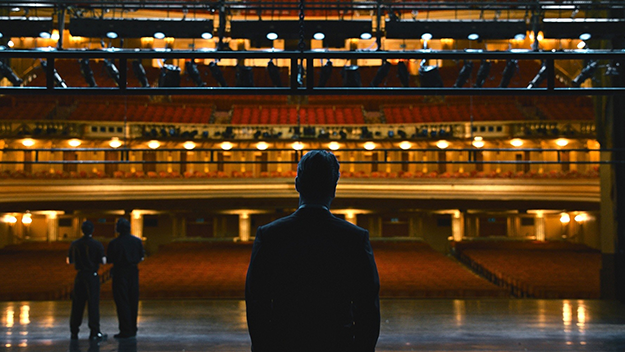
“It’s not a biopic.” That’s the mantra behind the publicity for Steve Jobs, the flashy biographical feature written by Aaron Sorkin (The Social Network) and directed by Danny Boyle (Slumdog Millionaire), about the (positive spin) spellbinding visionary and the (negative spin) ruthless entrepreneur who cofounded Apple. If a movie is good enough, it transcends categories. When was the last time anyone called Young Mr. Lincoln or Citizen Kane or Lawrence of Arabia a “biopic”? As a historical playwright even more celebrated than Sorkin might have put it, “The filmmakers doth protest too much, methinks.”
Steve Jobs is as inordinately proud of its untraditional structure as the real Jobs was of putting a novel, friendly face on the Macintosh computer. As anyone who absorbs movie coverage in any form knows by now, Sorkin strove to capture Jobs’s essence in 40- to 45-minute chunks, set before the successive launches of the Mac in 1984, the NeXTcube in 1988, and the iMac in 1998—the beginning of his industry-changing 12-year winning streak.
What’s initially comforting but finally disappointing about the finished movie is that it plays out so accessibly and conventionally. Every man or woman with more than a few lines gets an easy-to-read character arc and resolution—including Steve Jobs, who in the end faces up to his unholy trinity of perfectionism, narcissism, and Machiavellian leadership by admitting, to his long-suffering daughter, “I’m poorly made.”
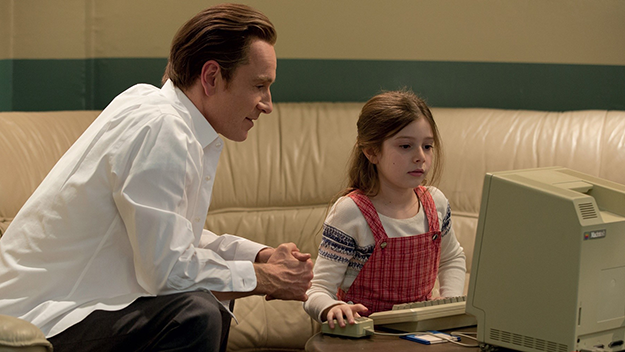
The slick pre-launch framing device of each extended sequence allows Boyle to prepare for a three-stage adrenaline rush as adroitly as the director of a come-from-behind football movie. The initial euphoria of the Mac attack on personal computing, then Jobs’s breakaway from Apple with NeXT—including NeXT’s tiptop software, which provides his ticket back to Apple—are preparation for the perfect rollout of the iMac.
Boyle’s work here is characteristically exuberant and virtuosic, and it’s atypically hollow. Formally, the film is a cheat: despite each sequence unfolding in “real time,” Sorkin and Boyle pepper the film with flashbacks that heighten Jobs’s conflicts, particularly with the Apple board of directors. The climax of this movie is as shameless as those sports movies or backstage dramas that contain shots of crowds breaking into thunderous stomping and applause—compelling movie audiences to join in, whether they want to or not.
It’s fun to think of Boyle using the surefire momentum of Sorkin’s strategy to experiment with different color schemes and shooting formats (greens and greys shot on 16mm for the Mac, reds and golds on 35mm for NeXT, soothing earth tones on digital for iMac). But the movie is too busy tracing Jobs’s rise, stumble, and rise again to allow anything visionary of its own to bloom. Despite the film’s depiction of Jobs’s character flaws, Steve Jobs plays like a victory lap. It isn’t nimble enough to suggest the irony of a company once bearing the motto “Think Different” now demonstrating “It’s Apple’s world—you just live in it.”
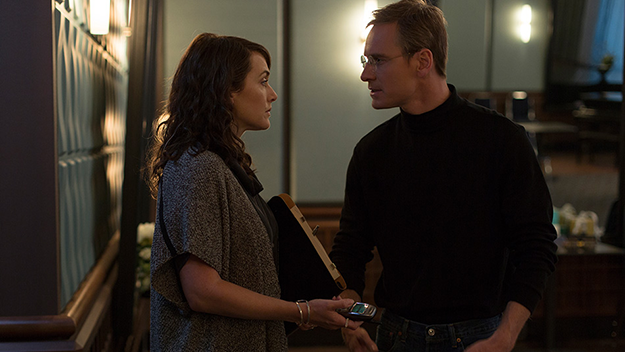
Sorkin based his work on Walter Isaacson’s 2011 biography and Sorkin’s original interviews with Jobs’s daughter Lisa Brennan-Jobs, whom Jobs refused to recognize as his child for half a decade, and with Joanna Hoffman, who made key marketing decisions for him both at Apple and at NeXT. Sorkin isolated four other essential characters in Jobs’s pre-iMac life, led by Steve Wozniak, the computer whiz who co-founded Apple and engineered its technological breakthroughs, and John Sculley, who became Jobs’s pick for Apple’s CEO after revolutionizing brand-name competition in the marketplace with “The Pepsi Challenge” when he ran Pepsi-Cola.
With his own display of technical ambition, Sorkin weaves these recurring characters, and Chrisann Brennan, Jobs’s high-school girlfriend and Lisa’s mother, in and out of the action while Jobs concentrates on major leaps forward in personal computing. Sorkin remains a virtuoso of snappy patter and multi-character choreography. To push these melodramatis personae toward the goal line, Sorkin resorts to the dramatic equivalent of deflating footballs. He makes everyone except Jobs relatively small and manageable. Each gets to spout off on one or two issues and embody human-size traits that collide with Jobs’s towering megalomania.
Woz, for example, repeatedly begs Jobs to acknowledge the team that made the Apple II, the trailblazing product that kept their company afloat for years. (Jobs doesn’t want to highlight anything in the company’s past; he also can’t stand that Woz’s team designed the Apple II without Jobs’s preferred “end-to-end control.”) Unlike his needle-thin partner with the razor-like focus, the bearish Woz believes a man can be a visionary and a mensch. Sculley, observant and urbane, nudges Jobs to admit that he’s obsessed with having been adopted and is using Sculley as a father figure; Sorkin tinges their ultimate split with Oedipal tension.
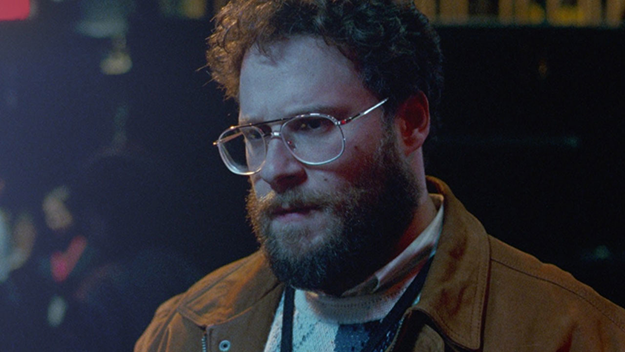
Andy Hertzfeld, a member of the first Macintosh team, doesn’t flinch when Jobs threatens him with public embarrassment if he’s unable to get the Mac to speak at its unveiling. Later he turns out to be the most stable adult male in Jobs’s daughter’s life. Jobs’s moral guide is the tough, warm Hoffman, who considers it unethical for Hertzfeld to use technological sleight of hand to make the Mac speak. More important, she keeps cajoling Jobs to embrace Lisa and act like her actual father.
The conflicts and life lessons zip by quickly, in the walk-and-talk fashion that Sorkin perfected on The West Wing and Jobs practiced in real life. The script includes Jobs’s famous admonition to Sculley: “Do you want to sell sugared water for the rest of your life? Or do you want to come with me and change the world?” Almost all the lines Sorkin selects or writes himself are on that hyperbolic level. When Andy Cunningham (the under-used Sarah Snook) advises Jobs that the fire department won’t let him cover up or take down the Exit signs for a presentation, Jobs responds: “If a fire causes a stampede to the unmarked exits, it will have been well worth it for those who survive.” When Hertzfeld protests that his team can’t fix a “system error” and make the Mac prototype speak “seconds” before the curtain goes up, Jobs sneers that Hertzfeld had three weeks to get things right, and “the universe was built in a third of that time.” Hertzfeld comes back with: “Well, someday you’ll have to tell us how you did it.”
It’s a tribute to Sorkin’s theatrical instincts that these overblown if amusing wisecracks are all of a piece with Jobs’s declarations that the spread of personal computing will cause a tectonic existential shift unlike any in previous human history. But Sorkin’s storytelling is second-rate here. The saga of Jobs being knocked off the cover of Time magazine because (he thinks) a reporter unearthed the story of his spurned daughter zooms by like so much undigested hearsay; references to “Daniel Kottke” as the source of the damning tale will mean nothing to people who haven’t read Isaacson’s book. It’s a big failing, because Sorkin treats Jobs’s later realization that Time wasn’t planning to make him its cover boy anyway as if it were an epiphany.
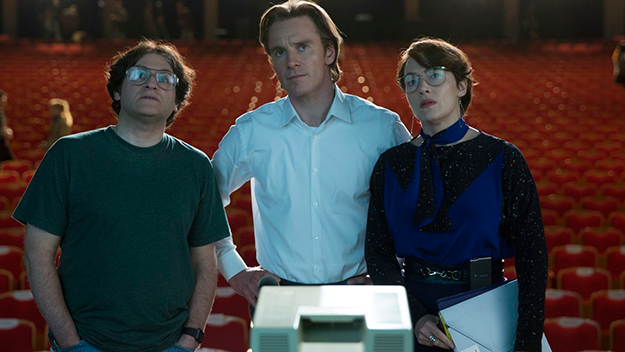
Jobs’s grandiose claims clash with his insufferably trivial behavior, especially when he’s balking at lifting his ex-lover and child out of welfare. Viewers appreciate the ironic distance between Jobs’s heroic career and personal pettiness, but they don’t feel it—in their bones—because of an odd sort of displacement. Steve Jobs, unlike The Social Network, plays like a Sorkin workplace dramedy. As a result, these interruptions start to annoy audiences, who want the characters to get on with their jobs—or at least learn to stop worrying and love Jobs. In the third act, Jobs, in his most likable comic moment, complains that it’s absurd for people to settle scores with him right before each product launch. By then, Sorkin’s strategy backfires: Jobs’s exasperation becomes appropriate.
The cast cannot be faulted. Seth Rogen as Wozniak and Kate Winslet as Hoffman manage to embody people of conscience without an ounce of smugness. Rogen’s Woz appears both angry and whacked by fate when he tells Jobs that he’s sick of being considered Ringo Starr to his John Lennon. Winslet shrewdly plays Hoffman as a straight talker with an Eastern European worldliness and earthiness that take the edge off her sermonizing. She looks up to Jobs for valuing what a man makes, not how much he makes, but she says the best part of a man, when he becomes a parent, should go into his fathering, not his technological output. You can see why Winslet fought to get this role. Not only does Hoffman get almost as much screen time as Jobs, but for once a script treats the right-hand woman of a techno-mogul as his overall equal, and in some ways his superior: Hoffman never hesitates to berate Jobs for his private and professional foul play.
Michael Fassbender, as Jobs, is impressive (as usual), no matter how much better-looking and more charismatic he is than the real tycoon. He succeeds at imbuing Jobs with a febrile edge that makes him a perfect foil, whether for Jeff Daniels’s heavy-set suaveness as Sculley or Winslet’s bluntness as Hoffman. His enjoys his best acting moments with Jobs’s daughter, played at age 5 by Makenzie Moss, at age 9 by Ripley Sobo, and at age 19 by Perla Haney-Jardine. He conveys Jobs’s feeble, sporadic attempts to turn the rare time he spends with Lisa into teachable moments. Moss, in particular, is a tiny genius of an actor. She’s both poignant and funny (and not “kid” funny) as she tries to insinuate herself into her father’s life. She wins whatever heart he has when she doodles on the Mac and says of the result: “It’s an abstract.” But Fassbender can’t elevate Sorkin’s Jobs beyond being a gifted technocrat with 20-20 tunnel vision.
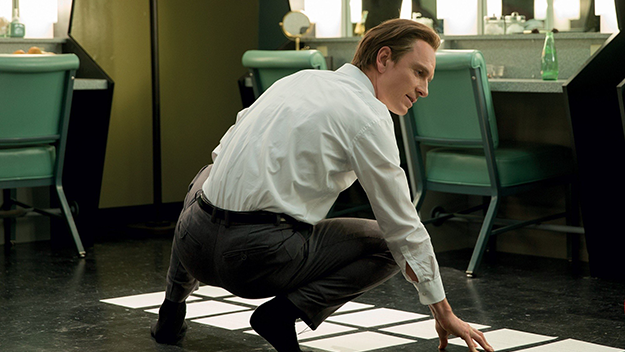
Sorkin’s Oscar-winning script for The Social Network played with elements of Mark Zuckerberg’s life and the history of Facebook the way Herman Mankiewicz toyed with William Randolph Hearst and his communications empire in Citizen Kane. Sorkin and his inspired director, David Fincher, wittily conveyed how new media reflect and exploit the curiosity and the shallowness—the strengths and the weaknesses—of creators and users alike. The genuine sequel to The Social Network is Alex Gibney’s open-ended documentary, Steve Jobs: Man in the Machine. It questions whether Jobs’s narcissism, his corruption of counterculture attitudes and Zen aesthetics, and his lack of civic responsibility helped to mold a technology that isolates and dominates consumers more than it brings them together. The documentary describes why Jobs put the “I” in his product line from “iMac” to “iPad.”
For all its busy-ness, Steve Jobs is simply a movie about a Great Innovator with a tragicomic flaw—an empathy gap. In classic Hollywood fashion, it suggests that he becomes an even greater innovator as he becomes a better man. At the end, Lisa is about to climb into a VW bug, another brilliant machine with a morally tainted past (and present), when Jobs notices her Sony Walkman. He tells her that he’s going to build a device that will hold a thousand songs and it will fit in her pocket. It’s a happy ending for a tech-besotted age.



